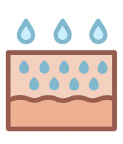Assessing Skin Layers’ Hydration Accurately:How the Right Instruments Unlock Credible Cosmetic Claims
- Emma Danciu
- Aug 26, 2025
- 7 min read
Updated: Jan 21
The skin is our body’s largest organ and its role goes far beyond appearance—it is our first line of defense. The skin protects us from countless external factors that could otherwise cause harm: microbes, pollution, UV radiation, chemical irritants, and physical injuries.
Because of this, the skin is incredibly precious. It regulates hydration, temperature, and sensory perception while serving as a barrier that keeps the inside world safe from the outside. Every layer of the skin—whether preserving moisture at the surface, renewing cells in the epidermis, or maintaining structural integrity in the dermis—works together to ensure balance and resilience.
Understanding the skin’s protective function is essential: if the barrier is weakened, not only do we experience cosmetic issues like dryness, irritation, or premature aging, but the body also becomes more vulnerable to deeper damage.
Our skin is a multifunctional barrier system that safeguards internal homeostasis—the dynamic balance—against the external environment. Its protective role is critical:
Physical barrier: The stratum corneum prevents excessive transepidermal water loss (TEWL) while limiting the penetration of pathogens, allergens, and chemical irritants.
Chemical barrier: Lipids, natural moisturizing factors, and acidic pH maintain antimicrobial defense and regulate enzymatic activity.
Immunological barrier: Langerhans cells, keratinocytes, and resident immune cells detect and respond to microbial and environmental threats.
Photoprotective barrier: Melanocytes and endogenous antioxidants protect against UV-induced DNA damage and oxidative stress.
When this barrier is compromised—whether by external factors, cellular damage from free radicals, or inappropriate cosmetic practices—the consequences extend beyond surface changes. Disruption may lead to inflammation, increased sensitivity, accelerated aging, pigmentary disorders, and heightened susceptibility to infection.
From a cosmetic and dermocosmetic science perspective, understanding the skin’s defensive role is essential for designing interventions that strengthen barrier integrity, preserve hydration, reduce oxidative stress, and protect dermal structures.
By targeting specific layers and mechanisms, cosmetics and dermocosmetics contribute not only to aesthetic outcomes but also to the maintenance of skin health and resilience in the face of constant environmental challenges.
The skin’s ability to function as the body’s living shield relies on the integrity of its barrier, the efficiency of its cellular renewal, the resilience of its structural proteins, and the vigilance of its immune system. However, daily exposure to harmful external factors and dehydration continuously challenges these mechanisms, accelerating visible aging and compromising skin health.
Cosmetics and dermocosmetics sciences provide targeted strategies to reinforce these natural defenses—by repairing the barrier, protecting against oxidative and photodamage, supporting collagen synthesis, and preserving immune surveillance. In this way, these sciences’ interventions move beyond aesthetics, acting as essential tools to maintain skin homeostasis, resilience, and long-term health.
Skin Defense & Integrated Strategies: Dermocosmetic & Cosmetic Approaches
The skin is constantly challenged by intrinsic aging and environmental stressors, as mentioned earlier. A holistic approach combines Dermocosmetic strategies—supporting skin health and barrier function—with Cosmetic strategies—enhancing appearance and radiance. |  |
1. Skin Surface - Immediate Radiance & Aesthetic Enhancement
Challenges:
Dullness, tired-looking skin, and uneven texture reduce visual appeal.
Dermocosmetic Strategies:
Hydrating and barrier-supportive ingredients → optimize the condition of the stratum corneum, enhancing the skin’s readiness for cosmetic application.
Cosmetic Strategies:
Reflective powders, primers, or serums → diffuse light and create instant glow.
Plant antioxidants and moisturizers → plump and refresh the skin.
Combined Relevance:
Skin looks healthier, smoother, and more radiant while benefiting from underlying barrier and antioxidant support.
2. Stratum Corneum – Outer Barrier Protection & Hydration
Challenges:
Dryness, mechanical damage, harsh cleansers, pollution, and aging can weaken the skin barrier, increasing transepidermal water loss (TEWL) and leading to rough or sensitive skin.
Dermocosmetic Strategies:
Ceramides, cholesterol, fatty acids → restore lipid balance and barrier integrity.
Humectants (hyaluronic acid, glycerin) → draw water into the epidermis.
Occlusives (protective skin barrier ingredients (dimethicone), shea butter
→ lock in moisture and reduce TEWL.
Cosmetic Strategies:
Moisturizers and emollients → smooth rough texture and enhance softness of the skin surface.
Mild exfoliants (AHAs, BHAs) → refine skin texture for a luminous appearance.
Combined Relevance:
Maintains barrier health and hydration, reduces sensitivity, and improves immediate skin smoothness and plumpness.
3. Epidermis - Antioxidant & Brightening Defense
Challenges:
UV exposure, pollution, and metabolism create free radicals—reactive molecules that can damage cells and cause premature aging and uneven tone.
Dermocosmetic Strategies:
Topical antioxidants (vitamin B (niacinamides), C, E, ferulic acid) → neutralize free radicals.
Plant antioxidants → reduce inflammation and protect the skin.
Cosmetic Strategies:
Brightening agents (vitamin B (niacinamides) & C, licorice extract) → improve skin tone and radiance.
Combined Relevance:
Protects cellular integrity, prevents pigmentary changes, and promotes luminous, even-looking skin.
4. Skin Surface & Epidermis – Photoprotection
Challenges:
UV radiation can damage DNA, proteins, and lipids, leading to wrinkles, dark spots, and long-term aging.
Dermocosmetic Strategies:
Broad-spectrum sunscreens → protect against UVA/UVB rays.
Additional antioxidants → support the skin’s natural defenses.
Cosmetic Strategies:
Light-diffusing SPF formulations → provide sun protection with an immediate radiant finish.
Combined Relevance:
Prevents long-term sun damage while enhancing the visible appearance of the skin.
5. Epidermis & Dermis Interface - Firmness, Elasticity & Resilience
Challenges:
Aging, gravity, and UV exposure reduce collagen and elastin, causing sagging and fine lines.
Dermocosmetic Strategies:
Collagen-boosting ingredients → stimulate collagen and elastin synthesis.
Topical retinoids or plant-based retinol alternatives (bakuchiol) → promote skin renewal and remodeling.
Antioxidants → protect structural proteins from damage.
Cosmetic Strategies:
Lifting serums and firming creams → improve visible firmness of skin.
Temporary plumping agents → smooth fine lines and add volume for a youthful look.
Combined Relevance:
Maintains structural integrity, improves firmness, and visibly reduces signs of aging, making skin look smoother, stronger, and more resilient.
Science-backed dermocosmetics and appearance-focused cosmetics strategies are complementary—one reinforces skin function and resilience, the other enhances visual results immediately. Together, they create strong, healthy, and visibly radiant skin. |  |
Discover the MoistureMeter Series:
Experience Accurate Skin Hydration Measurement From Surface to Depth
Stratum Corneum Epidermis Dermis
When it comes to assessing skin layers' hydration with precision, nothing matches the reliability and versatility of the MoistureMeter series. Comprising the MoistureMeterSC™, MoistureMeterEpid™, MoistureMeterD Compact™, and MoistureMeterD™ 4 probes (from 0.5 mm to 5 mm depth), these Instruments are engineered to provide the most accurate and complete evaluation of all three skin layers.
With comprehensive measurement depths, they capture skin hydration from the stratum corneum to the deeper dermis, delivering reproducible insights with pinpoint accuracy.
The MoistureMeter Series is the ultimate choice for professionals
who demand precision at every layer.
MoistureMeterSC™ | MoistureMeterEpid™ | MoistureMeterD™ Compact | MoistureMeterD™ 4 Probes |
 |  |  |  |
 |  |  |  |
Surface Barrier Hydration | Epidermal Water Balance | Deep Dermal Hydration | Complete Skin Spectrum |
MoistureMeterSC™ – Precision at the Skin Surface
The MoistureMeterSC™ is specialized for measuring stratum corneum hydration, the outermost skin layer that directly reflects skin barrier function and dryness.
Measurement depth: 0.5 mm
Applications:
Tracking skin dryness and evaluating moisturization levels
Supporting cosmetic and dermocosmetic claims for barrier repair creams, occlusive moisturizers, and emollients
Research on atopic dermatitis, xerosis, and other barrier-related conditions
Comparative studies between treated vs. untreated skin areas in clinical trials
Unique advantages:
Insensitive to electrolytes, it has been specifically optimized for detecting subtle changes in surface hydration, making it ideal for short-term studies (minutes to hours after product application).
MoistureMeterEpid™ – Insights into the Epidermis
The MoistureMeterEpid™ provides information on hydration in the viable epidermis, where water retention and balance are critical for skin elasticity and resilience.
Measurement depth: 1–1.5 mm
Applications:
Evaluating the efficacy of hydrating serums, humectants, and barrier-strengthening actives
Studying epidermal physiology and skin aging processes
Research into compromised hydration in conditions like psoriasis or eczema
Supporting long-term product claims where epidermal hydration plays a key role
Unique advantages:
Provides a clearer picture of the skin’s water reservoir, helping differentiate between surface effects and deeper, longer-lasting hydration.
MoistureMeterD™ Compact – Portable Accuracy for the Dermis
The MoistureMeterD™ Compact is a streamlined, portable device for measuring dermal hydration, offering researchers deeper insights while remaining simple to use.
Measurement depth: 2.5 mm
Applications:
Studying dermal hydration linked to collagen structure, elasticity, and skin plumpness
Supporting claims for anti-aging, dermal-filler–inspired cosmetics, or deep-hydrating actives
Monitoring hydration changes in dermatological treatments and therapies
Clinical trials where robust dermal-level insights are needed in a portable, field-ready format
Unique advantages:
Compact form factor makes it ideal for on-site or field studies, combining portability with deep-layer accuracy.
MoistureMeterD™ 4 Probes – The Complete Multi-Layer Solution
The MoistureMeterD™ 4 probes is the most versatile instrument in the series, capable of measuring hydration across all key skin depths, from 0.5 mm to 5 mm.
Measurement depths: 0.5 mm, 1.5 mm, 2.5 mm, and 5 mm
Applications:
Comprehensive skin research covering the stratum corneum, epidermis, and dermis
Full-spectrum cosmetic and dermocosmetic claims validation (e.g., hydration, anti-aging, barrier repair)
Comparative studies of multi-active formulations across different skin layers
Clinical research requiring layer-by-layer analysis to understand how treatments act at varying depths
Unique advantages:
Delivers multi-layer versatility in one instrument, eliminating the need for multiple devices and enabling direct comparisons across depths in the same subject.
From the surface barrier to the deep dermis, the MoistureMeter series empowers professionals with scientifically accurate, reproducible results. While all four instruments share the core strengths of being lightweight, non-invasive, reliable, and instant in any position and on any part of the body, each device also provides layer-specific advantages that make it uniquely valuable.
Whether you are conducting cutting-edge cosmetic R&D, validating cosmetic or dermocosmetic claims, the MoistureMeter family delivers the most accurate and complete assessment of skin hydration available today—setting a new benchmark for credibility and confidence in skin science.
With the MoistureMeter Series, performance meets trust—empowering brands to back their innovations with undeniable scientific proof.

PUBLICATIONS
MoistureMeterSC™
NATIONAL LIBRARY OF MEDICINE
Measurement of hydration in the stratum corneum with the MoistureMeter and comparison with the Corneometer.
MDPI
Soy Protein Containing isoflavones Improves Facial Signs of Photoaging and Skin Hydration in Postmenopausal Women: Results of a Prospective Randomized Double-blind Controlled Trial.
JOURNAL OF CLINICAL MEDICINE
Prospective Evaluation of a Topical Botanical Skin Care Regimen on Mild to Moderate Facial and Truncal Acne and Mood.
MoistureMeterEpid™
CLINICAL, COSMETIC AND INVESTIGATIONAL DERMATOLOGY
Efficacy and Safety of Skin Radiance Collagen onSkin and Hair Matrix: A Placebo-ControlledClinical Trial in Healthy Human Subjects.
JOURNAL OF COSMETIC DERMATOLOGY
The Effects of an Oral Supplementation of a Natural KeratinHydrolysate on Skin Aging: A Randomized, Double-Blind,Placebo-Controlled Clinical Study in Healthy Women.
JOURNAL OF COSMETIC DERMATOLOGY
Revitalizing skin, hair, nails, and muscles: Unlocking beauty andwellness with vegan collagen.
MoistureMeterD™ Compact
FOOD AND NUTRITIONAL JOURNAL
Amino Acids Oral Treatment for the Amelioration of Skin, Hair, and Nails Conditions: An Open-Label Study.
COSMETICS
Clinical Investigation of Collagen-Based Electrospun Nanofibers for Enhanced Delivery of Skincare Ingredients.
RESEARCH GATE
A pilot study testing efficacy and tolerability of hybrid cooperative complexes of hyaluronic acid intradermal injections in Chinese women.
MoistureMeterD™ 4 Probes
CLINICAL, COSMETIC AND INVESTIGATIONAL DERMATOLOGY
VYC-12 Injectable Gel Is Safe And Effective ForImprovement Of Facial Skin Topography: A Prospective Study.
COSMETICS
A Novel, Multifunctional, Natural-Based Emollient: An Exhaustive Characterization of Sharofeel DS.
CLINICAL PHYSIOLOGY AND FUNCTIONAL IMAGING
Skin Tissue Dielectric Constant: Time of day and skin depth dependence.

















Comments